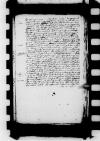⌊⌋ vobis superioribus diebus respondimusque ⌊⌋ vestris, quas Dominatio Vestra ad nos dederat, quibus innuebat propter detentas decimas per dominum ⌊gladiferum Cracoviensem⌋ se domino ⌊Georgio Hegel⌋ dumtaxat quinquaginta aureos soluisse, cum tamen Dominatio Vestra receperat se immo nobis promiserat post abitum nostrum ex ⌊Cracovia⌋ nostro nomine ipsi domino ⌊Georgio⌋ centum aureos se daturam, qua spe nos litteras nostras, quibus ab eiusmodi summa Dominationem Vestram absolvimus, apud illum reliqueramus. In quibus omnibus res longe secius atque nos existimationem de Dominatione Vestra habueramus, cecidit, ut pote ne ullum quidem teruntium a Dominatione Vestra dominum ⌊Georgium Hegel⌋ vidisse, quod nos in summam admirationem et quandam in aliam quam de Dominatione Vestra opinionem conceperamus, adducit ob idque potissimum, quod ad novissimas eas ⌊⌋ nostras ne verbum quidem responderit, quo hanc a se noxam diluisset, vel quomodo res haec haberet, nos certiores reddidisset.
Accedit praeterea, quod mense elapso ⌊cancellarium nostrum⌋ ad curandum ecclesiae regimen atque ad cognoscendum vel saltem a ⌊fratre⌋ Dominationis Vestrae, quid sibi velit, quod Dominatio Vestra promissam solutionem protraxerit, in ⌊Goląbya⌋ mitteremus. Quo cum venisset, nihil rescire potuit, quinimo audivit ab eodem Dominationis Vestrae ⌊fratre⌋ post multas ad nos oblationes, quod in principio mensis Februarii domino ⌊Georgio Hegel⌋ sexaginta aureos misisset, quod sic factum esse ab eodem ⌊Georgio Hegel⌋, qui XIIII Martii praeteriti ad nos ⌊⌋ non intelleximus, verum se tum hactenus nihil percepisse de iis centum aureis, quos daturam se Dominationem Vestram receperat, asserebat. Idipsum item, qui<d> fiat, satis mirari non possumus. Qua de re, cum edocti simus Dominationem Vestram agere impresentiarum in aula aut ubicumque illa fuerit, {quod} hunc nuntium nostrum cum iis ad eandem Dominationem Vestram miserimus. A qua amice postulamus et rogamus, ut cum eo nobis significet, quomodo ista habeant mentemque suam nobis declaret, quid nobis de Dominatione Vestra polliceri debemus habentes pro veteri inter nos amicitia eam fiduciam, quod Dominatio Vestra non secus se in his erga nos geret, quam honestae nobilitatis bonique nominis viro et equite bene convenit.
Quam in Christo Domino nostro bene valere optamus.
